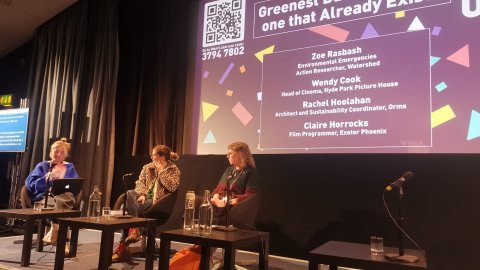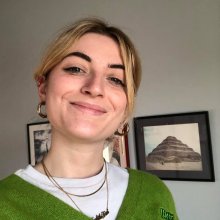
Zoe Rasbash Environmental Emergencies Action Researcher
on Fri 5 Sept 2025Five years of Climate Action at Watershed - Part 1
Posted on Fri 5 Sept 2025
Zoe Rasbash has been Watershed's Environmental Emergencies Action Researcher for the past five years. As she leaves us for new challenges she takes some time to reflect on all that she, and we have learned. This is the first of a two-part article.
PART ONE: Beyond Decarbonisation
In the first of this two part article, Zoe Rasbash (Watershed's Environmental Emergencies Action Researcher) reflects on almost five years of climate action at Watershed.
Recently, I've had a flurry of people reach out to me saying that the Creative Climate Action Toolkit has been of great use to them. The toolkit, created four years ago, is a resource for creative freelancers and small businesses to begin their climate action journey. It offers a process for helping people to prioritise and has a list of crowdsourced actions.
It is affirming to hear that the work is useful, and that the toolkit is being taken up in the spirit in which it was created: in the belief that artists, cultural workers and cultural organisations are an essential part of transitioning to a greener, fairer society.
Even as I appreciate this feedback, I find myself hesitating. The toolkit, while valuable, feels increasingly insufficient in the face of what we’ve been learning at Watershed throughout our climate action journey. I am uncomfortable simply encouraging incremental decarbonisation actions without acknowledging the deeper systems and contradictions at play. I have been nervous to write this because I don’t necessarily have any alternative, any ‘toolkit.2: what to do next’.
So, I am trying to sit in the tangle rather than reach for immediate solutions. Can I resist the urge to simplify and instead explore the contradictions honestly? That's what I hope to do here. And is what, I think, the arts make space for.
Watershed's Journey
At Watershed, we've been on a journey. After declaring a climate emergency in 2019 we set ambitious targets to reach net-zero by 2030. We did carbon literacy training with all staff, embedded a deeper and wider carbon accounting system, examined our supply chains and created programs to support artists making climate-focused work. We discussed climate justice and alliance building at length but a key focus remained on measuring and collectively reducing emissions while recovering from the pandemic – as that is the standard set in the sector.
Yes, we must decarbonise. But decarbonisation alone, will not solve the climate crisis. Because the climate crisis is just the symptom of the problem.
Climate change is a product of intertwined economic and historical systems operating across centuries: capitalism and colonialism. In the UK, the dominant economic model relies on endless growth and continues to deplete finite resources - not primarily for human wellbeing but for-profit accumulation. We are stuck in a system where our relative wealth is dependent on the over-extraction of resources in the Global South; burning fossil fuels into a rapidly changing atmosphere, war-mongering to retain control over resources and systematically exploiting people for cheap labour to produce goods we don’t even need.
And we do all of this to fuel an economy which is still unable to meet the needs of human wellbeing. The UK economy is the sixth largest in the world and yet 31% (4.5 million) children live in poverty. Those in power propagate the idea that capitalism is the only way to function, and economic growth is the only way to meet human needs. But if our communities are living in poverty, climate disasters are increasing, and the world’s top 1% own more wealth than 95% of humanity what is the model achieving at all?
Scaling renewable energy for an economy that is continuously growing requires an unimaginable amount of rare mineral extraction. A 2017 World Bank Report indicates that decarbonising half the global economy by 2050 would need 34 million metric tons of copper, 40 million tons of lead and 4.8 billion tonnes of iron. Even as our planet's biophysics scream 'enough', those in power sell us workarounds, depoliticise climate change and placate us with the idea that we can buy our way out of this crisis with reusable water-bottles. So when we hear 'decarbonisation is the answer!' we must be critical: clean energy and technologies alone won't solve this crisis if we don't challenge endless growth.
If we don’t slow down our economy and find another way to live, clean energy transitions will redouble colonial exploitation. In fact, they already are. Decarbonisation, although important, is not enough without political and social transformation.
What has this got to do with Watershed?
This may feel unrelated to the culture sector but as arts are increasingly defunded and privatised, it has everything to do with us. Since the global financial crash, COVID pandemic and cost of living crisis, local funding for the arts has dropped by 43%. Culture is resilient but we have already seen venue closures, programme cuts, and job losses.
When financial growth is the metric of success at a time of financial scarcity then we are forced to do more with less. Profit is beaten into how we measure successful cultural production. The easiest way to bring down overheads is to reduce labour costs. More work, but less jobs. Or less good, fairly-paid jobs. When we're asked to constantly demonstrate ‘growth’ in audience numbers to secure funding or when we're pushed to expand programming without proportional resources, we're feeling the effects of the same growth-focused systems that drive environmental degradation, burn out and inequality.
It might seem far-fetched to name colonialism and capitalism as the major issues for a mid-sized arts organisation in the UK, but we cannot extract ourselves from the way these logics organise our lives. Watershed wants to move through them, we want change, we are frustrated. But the scale of these systems and how embedded they are within our lives means that making clear plans is difficult.
Cultural Work as Transformation
When we feel overwhelmed it might feel easier to turn away. Particularly for those of us who knowingly or unknowingly uphold these systems (in our whiteness, class privilege, cis-ness, able-bodiedness). But it is important to face and name - name the hypocrisies, the discomfort, pain, confusion.
I write this from Barcelona, where Watershed has graciously allowed me to go on sabbatical to study Degrowth. I am learning about an alternative vision for organising our economy around human needs rather than endless consumption, focusing on economic democracy, care, and public ownership.
Degrowth research shows we have enough resources to ensure everyone on earth has a good quality of life while staying within planetary boundaries three times over, but our economy doesn't allow us to do this.
The good news is that we have solutions - ideas for reorganising society toward justice and sustainability are abundant. The challenge is building the collective will for transformation.
To think ‘I can’t change this, it’s too big’ and let the disaffectedness grow, may be a product of undealt with white savourism, which I (and many other white women in the climate space) am prone to. I now lean into the collective and take deep solace that I can only do what I can in my corner of the world and have faith that my comrades across the world are doing the same.
The role of artists and cultural spaces in this process is vital - not just in making revolution seem irresistible, but in making any kind of alternative feel possible.
At Watershed, even as we struggle with contradictions, we're experimenting with different ways of working that might point toward alternatives. I can’t speak on behalf of all our staff members, but I know that many of my colleagues totally believe another way of living and being is possible.
These systems show up in all sorts of ways at Watershed, and every day we are faced with the contradictions of staying alive as an organisation while staying true to our values. In Part Two, Zoe details the complex ethical decisions we have to make when trying to build a Watershed that exemplifies a fairer world, and where we see the seeds of change.

